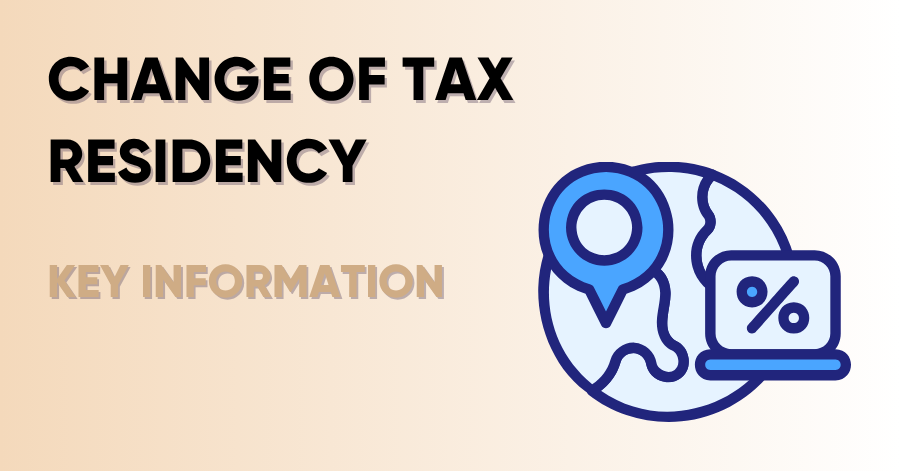
Changing Tax Residency – When and How to Report It to the Tax Authorities
With increasing professional mobility and the growing number of people living and working abroad, more individuals are finding themselves subject to tax obligations in more than one country. A key factor in determining where income tax must be paid is tax residency. Changing your country of residence for tax purposes – especially mid-year – has serious legal and financial consequences. In this article, we explain when such a change occurs, how it is assessed by Polish tax authorities, and what taxpayers should do to properly document and report their new status.
What is tax residency and why does it matter?
Tax residency determines in which country an individual must pay income tax. According to Polish tax law, a person is considered a Polish tax resident if they meet at least one of the following conditions: they spend more than 183 days in Poland in a given tax year, or they maintain a centre of vital interests (personal or economic) in Poland. If either of these conditions is met, the person is subject to unlimited tax liability in Poland, meaning they must declare and pay tax on their worldwide income. If neither condition is met, they are a non-resident and are taxed only on income earned in Poland.
How is a change in tax residency identified?
Changing tax residency is not done via a simple declaration or form. It results from actual changes in life circumstances—for example, permanently moving abroad, relocating your business activity, or shifting your personal and economic ties to another country. While some indicators are formal (such as ending a rental agreement or closing a business in Poland), many are factual—such as spending most of your time abroad, working for a foreign employer, or moving your family with you. Spending more than 183 days in another country may be sufficient for that country to consider you a tax resident under its local law.
Is there a form to notify Polish authorities of the change?
Polish law does not require or provide a formal notification process for changing tax residency. Tax offices do not issue decisions confirming loss of Polish residency. Instead, residency is determined by analyzing the individual's full personal and economic circumstances. However, it is possible to request a certificate of Polish tax residency if needed to confirm current status—typically for use with foreign tax authorities. To demonstrate a change in residency, the taxpayer should collect evidence such as rental agreements, employment contracts, foreign tax IDs, utility bills, and other documents confirming the shift of personal and financial life abroad.
What happens when residency changes mid-year?
A change in tax residency may occur during the tax year. In that case, the person is considered a Polish tax resident up to the date they cease to meet residency criteria. For that period, they must declare their global income in Poland. After the change, they are treated as a non-resident and must report only Polish-source income. The annual tax return must reflect this split and include the appropriate annexes (e.g. PIT/ZG) for foreign income. It's worth noting that Polish citizenship is not decisive—what matters is where a person lives and maintains their vital interests.
What about dual tax residency?
There are cases where a person qualifies as a tax resident in two countries simultaneously, based on the local laws of each jurisdiction. When this occurs, tax treaties signed by Poland come into play. These treaties contain tie-breaker rules that determine which country has taxing rights. The key steps include assessing: (1) where the person has a permanent home; (2) which country holds their centre of vital interests; (3) where they usually stay; (4) their citizenship; and, if necessary, authorities from both countries may engage in a Mutual Agreement Procedure (MAP) to resolve the conflict. Applying these rules helps avoid double taxation.
Key considerations when changing your tax residency
Changing tax residency is not merely a matter of moving. It requires careful planning and thorough documentation. Before relocating, taxpayers should settle all outstanding obligations in Poland and prepare to comply with the regulations of their new country. This includes registering with local tax authorities, obtaining a local tax ID, and gathering documentation to confirm the change in residency. Additionally, individuals with significant assets may need to consider exit tax provisions that apply when shifting their tax domicile abroad. Proper planning can help avoid both compliance issues and unexpected tax costs.
Conclusion – Get expert help with your tax residency change
Changing your tax residency is a complex process that goes far beyond formalities. It affects where and how you declare income, settle obligations, and interact with tax authorities. It can involve multiple countries, different interpretations of tax treaties, and potentially serious financial consequences. If you're considering a move abroad, or unsure whether your status has already changed, it's critical to assess your situation early and plan accordingly.
At TaxCoach, we support individuals and entrepreneurs in all aspects of tax residency assessment, compliance, and international reporting. Contact our advisory team today and make sure your change of residency is safe, compliant, and fully documented.







.png)


